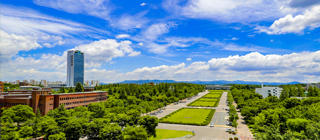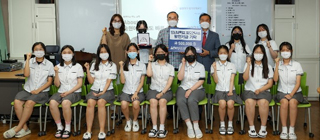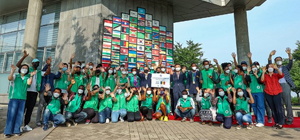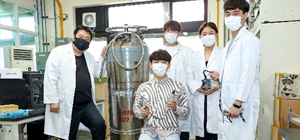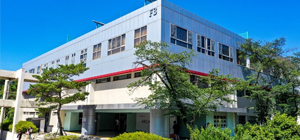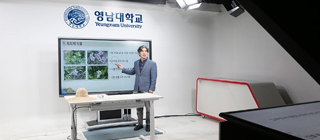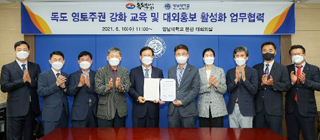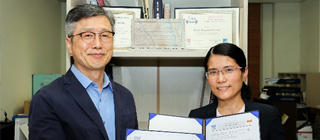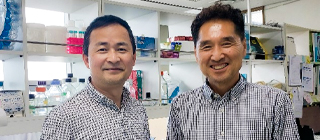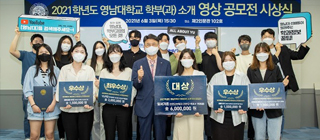-
Institute of Information & Communication and Institute of Life Sciences to receive a total of 14.7 billion KRW over 9 years to perform R&D Goal of future automobile core technology ‘reliability and ultra-safety’... Strengthening industrial competitiveness and fostering specialized personnel ‘Inter-disciplinary convergence research’ with the goal of coming up with comprehensive solutions for senior ‘sarcopenia’ [July 9, 2021] YU’s attached research institutes - Institute of Information & Communication (Head Park Yong-wan) and Institute of Life Sciences (Head Kim Choon-young) - were selected as College Central Research Centers in the science and engineering sector in 2021 by the Ministry of Education. The ‘College Central Research Center Support Project’ that is hosted by the Ministry of Education and National Research Foundation is a core national policy project for the science and engineering sector that aims at constructing research hubs within universities to support infrastructure of university attached research centers to specialize college research institutes and strengthen their expertise, while also providing support to foster outstanding young researchers. With the selection for this project, the YU Institute of Information and Communication will receive a total of 7.8 billion won from state and local government funding from nine years starting this year until May of 2030 to pursue R&D projects related to future automobiles. YU Institute of Information and Communication Head Park Yong-wan (Professor Information and Communication Engineering) stated, “R&D related to future automobiles tend to focus on configuring autonomous driving functions, and there is relatively insufficient research on procuring the safety and reliability of future automobiles. Malfunctions of sensors, radars, cameras, etc. that are the core technologies of future cars can result in serious safety issues.” He added, “We will focus on research to procure reliability and ultra-safety of core parts to secure industrial competitiveness in the future automobiles sector.” The YU Institute of Information and Communication plans to pursue projects for gaining ultra-safety and reliability for the operation of future cars through the development of life expectancy prediction technologies and safety diagnosis of environment-detecting sensors of future cars. Another major objective of the project is to strengthen domestic and foreign competitiveness of local automobile parts companies through automobile and ICT technology convergence, while also expanding the localization ratio of automobile conversion parts. It is also expected to do its role as a hub research center for fostering human resources for future automobiles, through joint research and cultivating experts through industry-academic cooperation. The YU Institute of life Sciences will also receive a total of 6.9 billion KRW until May of 2030 to pursue the ‘inter-disciplinary convergence sarcopenia diagnosis and intervention solution development and commercialization to respond to the ultra-aged society’ project. The Institute of Life Sciences that conducts research with the goal of improving quality of life will engage in convergence research based on medicine, kinematics, ergonomics, food nutrition science, and IT sectors to come up with an integrated solution for ‘sarcopenia’ that causes muscle loss among senior citizens. For this, Professor of Food and Nutrition Kim Choon-young that heads the institute, Professor of Clothing and Fashion Park Soon-ji, Professor of Electronic Engineering Lee Chan-soo, Professor of Physical Education Shin Sung-hoo, and Professor of Medicine (Orthopedics) Kim Gi-beom, and other experts of various sectors will participate in this study. Chief of the YU institute of Life Science Kim Choon-young said, “Our goal is to share awareness about sarcopenia that will be given a disease code starting this year to the general public, and to enhance accuracy of diagnosis and prescription to provide practical benefits to senior citizens.” She added, “We will collaborate with companies to commercialize research results and we will also develop functional exercise programs and develop exercise assistance instruments and functional foods. As we have entered the ultra-aged society, it is also crucial to collaborate with local governments to create efficient health policies while improving the health of Korean senior citizens. We will foster experts through continued collaboration with companies and research centers related with local governments, and promote overseas networking in order to become a global hub research center for sarcopenia.” In addition to the two institutes selected at YU, a total of seven were designated as college central research centers such as the Institute for Clean Technology, Institute for Cell Culturing, Dokdo Institute, Institute for Higher Education Policy, and the Institute for National Culture.
-
Extracurricular activities for proper historic awareness on Dokdo such as ‘Dokdo Newspaper Contest’, etc. Produced goods attached with ‘Dokdo PR Characters’ drawn by students for sale, and donated some of the proceeds YU Dokdo Institute plans to produce ‘Dokdo Plants Postcards’ and use it for educating adolescents [July 9, 2021] “We want the YU Dokdo Institute to take the charge in sharing with the world that Dokdo is our history and backed by historical facts!” Students and teachers of the Daegu Songhyeon Girls’ High School (Principal Park Young-do) are cheering on the YU Dokdo Institute. On the 8th, they donated 500,000 KRW in development funds to the YU Dokdo Institute. The students and teachers came together to support the education and research activities to share information about Dokdo, which is Korean territory. Recently, Songhyeon Girls’ High School held an in-school ‘Dokdo Newspaper Contest’ to raise awareness about Dokdo to students and to engage in “Our Territory Dokdo” PR activities. About 100 students participated in this contest and students drew ‘Dokdo PR Characters’ on the bottom of the newspaper as part of this contest. The development funds donated by Songhyeong Girls’ High School came some of the proceeds from making antibacterial mask patches with Dokdo PR characters that were sold to members of the school. Ms. Choi Eun-young, who is in charge of after-school education at Songhyeon Girls’ High School said, “We have been constantly offering extracurricular courses such as Making Dokdo Newspapers so that students can have proper historical awareness on Dokdo. Students also participate actively. Students study about Dokdo and using some of the earnings from PR activities, they donate it to institutions related to Dokdo, which can teach many things to them. We will continue to plan and pursue various extracurricular activities so that students can can develop proper historical awareness and character.” <Dokdo Newspaper and Dokdo PR Character Mask Patch made by students of the Daegu Songhyeon Girls’ High School> The Dokdo Institute plans to use the development funds donated by Songhyeon Girls’ High School to produce ‘Dokdo Plant Postcards’ and use it for educating adolescents. In addition to their donations to the YU Dokdo Institute, Songhyeon Girls’ High School also delivered the remaining proceeds and 2,600 mask patches to medical professionals through the Daegu Dalseo-gu Office. Second-year student Koh Jin-ju of Songhyeon Girl’s High School who participated in the Dokdo PR activities said, “The Dokdo Newspaper making activity was an opportunity to gain deeper understanding about Dokdo, which is our territory. I hope that every Korean will show more interest about Dokdo.” YU Dokdo Institute Director Choi Jae-mok said, “It is quite pleasing to see the youths, who are the future of Korea, being so interested in Dokdo and taking the initiative to promote Dokdo. The YU Dokdo Institute, which is an educational and research institute specializing in Dokdo, will engage in activities with a greater sense of responsibility.”
-
70th country to study at the YU Park Chung Hee School of Policy and Saemaul... Total 762 students from 70 countries Learned about the Saemaul Undong while studying in Malaysia in undergraduate school and thus decided to study in Korea “Want to work for the Chad government after graduating... Overcome poverty with Chad-style Saemaul development” [July 1, 2021] <International student from Chad, the 70th country to study at the YU Park Chung Hee School of Policy and Saemaul> (From left to right: Park Chung Hee School of Policy and Saemaul Dean Lee Hee-wook, Eissa Taher Gurbal Yousef from Chad) There is a student drawing much attention by coming to Korea to study from Chad, a lesser-known country in Africa. He came to study Korea’s unique science, ‘Saemaul Studies.’ He is Eissa Taher Gurbal Yousef (36) from Chad who enrolled at the YU Park Chung Hee School of Policy and Saemaul in March of this year. There was only one reason for him to come to a foreign land with unfamiliar foods and lifestyles. His only goal is to study about the Saemaul Undong so that he may contribute to the national development of Chad. Mr. Eissa majored in government and public policies at the University Tun Abdul Razak in Malaysia. He said, “I had the opportunity to learn about the success of Korea’s Saemaul Undong and about President Park Chung Hee back in 2015 during a political and economic science class. I thought that I would like to study about the Saemaul Undong in Korea back then. In September of 2015, I studied at the YU Department of Political Science and Diplomacy through an exchange student program, and then decided that I would study at the YU Park Chung Hee School of Policy and Saemaul after graduating.” He further explained why he decided to study in Korea saying, “I believe that new strategies and policies are needed to overcome poverty in Chad. We need a leader like Park Chung Hee and a Chad-style Saemaul Undong and international development cooperation model.” <70th country to study at YU to learn about Saemaul, Chad> A total of 762 students from 70 countries have studied at the YU Park Chung Hee School of Policy and Saemaul since it was opened in 2011. Eissa is the first from Chad, making his country the 70th to study at YU to learn about Saemaul. There are few cases in which a college attracted people from 70 countries in just 10 years of its founding in both undergraduate and graduate schools. This is because the entire world is focusing on the Saemaul Undong and Saemaul Studies. Mr. Eissa commented, “The Saemaul Undong that is based on hard work, independence and cooperation contributed significantly for Korea to overcome poverty and build social infrastructure. I believe that this is why developing countries around the world think of Korea as their role model for economic prosperity, and are interested in Saemaul Undong, and are exchanging with the Park Chung Hee School of Policy and Saemaul.” He added, “I want to study at YU to learn in detail about Korea’s Saemaul Undong project and the roles of the government. Furthermore, I want to learn the theories and practices of the Saemaul Undong and also learn about application methods of Saemaul development and how to lead the village people with leadership to pursue projects. He stated, “Personally, studying at the YU Park Chung Hee School of Policy and Saemaul is a very special opportunity. Major government officials, international development experts, and non-profit organization activists from around the world are studying at the Park Chung Hee School of Policy and Saemaul. The greatest advantage is that I will be able to debate with them, share information, and interact with them.” After graduating, I want to work for the government of Chad. Above all else, I want to help lead Chad overcome poverty.” <International students studying at the YU Park Chung Hee School of Policy and Saemaul> YU President CHOI Oe-chool (former professor of Saemaul and International Development) commented, “We developed the Saemaul Undong into an academic discipline and supoorted the installation and operation of Saemaul Economic Development Departments at universities in the Philippines and Cambodia. YU is focusing on fostering experts to respond to the demand for learning and sharing Saemaul Studies among governments and universities in African countries such as Ethiopia, Tanzania and Rwanda, as well as in Asian countries like Indonesia, Pakistan, and Tajikistan.” He further emphasized, “The Saemaul Undong, which was the policy for overcoming poverty in Korea, has now developed into an academic discipline, which has become the development policies of developing countries suffering from poverty, and it is also spreading as a model for overcoming poverty. Therefore, now is the time for a greater degree of interest and support.” Meanwhile, the YU Park Chung Hee School of Policy and Saemaul was founded back in November of 2011 to foster Saemaul and international development experts and regional development experts among public employees and public sector workers of developing countries. Up to now, 762 students from 70 countries were admitted, in which 641 people from 63 countries earned master’s degrees, who are now working as Saemaul and international development or regional development experts all around the world. As of July 2021, there are currently 84 students from 28 countries studying at the Park Chung Hee School.
-
Results of technological advancement of ‘Material Solution Park’, a start-up by Professor Park No-geun of the School of Materials Science and Engineering Possible to observe dust smaller than human hair at extremely cold temperatures such as liquid hydrogen and in outer space High industrial value as it can be used in various ways such as for inspecting the safety of liquid hydrogen storage and transportation equipment [July 2, 2021] <School of Materials Science and Engineering Professor Park No-geun's (second from left) research team> The research team of YU School of Materials Science and Engineering Professor Park No-geun (39) developed a ‘camera module’ that can film high-resolution images in extremely cold liquid hydrogen environments at negative 253 degrees. This device was the outcome of the technological advancement research of ‘Material Solution Park’, which is a YU faculty start-up. It has technological perfection that can clearly view dusts smaller than human hair inside of extremely cold liquid refrigerants. Professor Park, who is the president of Material Solution Park, explained, “In liquid refrigerant environments at extremely cold temperatures used to have large quantities of bubbles due to the boiling of liquid refrigerants, similar to that of water boiling in a kettle. The bubbles made images in front of the camera blurry.” He continued saying, “We developed a new iron material alloy called high-entropy alloy to minimize the bubbles from forming. Through the phase change of new materials and novel welding methods, we procured phase stability even during heat impact and collision at extremely cold temperatures. Through this, we were able to find the method for acquiring the best images.” Through this study, it has become possible to film high quality images even at extremely cold temperatures such as in space like the moon (-80 degrees) and Mars (-143 degrees), as well as in liquid natural gas (LNG, -162 degrees), liquid nitrogen (-196 degrees), and liquid hydrogen (-253 degrees). As carbon zero emissions have become a global issue recently, there has been an increase in demand for hydrogen energy. However, the high-pressure tank method used to store large quantities of hydrogen have the danger of accidents. Storing in liquid hydrogen state has the advantage that energy storage density increases by more than 800 times without the risk of explosion in atmospheric pressure. Professor Park’s research achievements are receiving a great deal of attention because it is expected that the liquid hydrogen storage method will be used in the near future. Professor Park commented, “Using this new technology developed with the support of the Ministry of SMEs and Startups allows observing the internal and external materials and welding/coupling defects in the liquid hydrogen storage tanks and transportation pipes, therefore having huge value as a safe inspection device. We are currently developing a small camera module with a size of a few centimeters.” He added, “It has high industrial value such as for the cell banking market that stores and checks the state of cord blood, as well as LNG storage complexes and LNG cogeneration generators.
-
Received the highest funding for project costs among Korean universities to carry out ‘domestic practical training and architectural exchange activities’ Recognized for excellence in site-oriented practical architectural education such as its operation of domestic and foreign field practices [June 28, 2021] <View of the YU School of Architecture Building> The YU School of Architecture was selected to receive the largest funding for project costs among domestic universities in the ‘Architecture Design Personnel Fostering Project’ sponsored by the Ministry of Land, Infrastructure and Transport and the Korea Agency for Infrastructure Technology Advancement. The ‘Architecture Design Personnel Fostering Project’ is a program pursued by MOLIT since 2019 with the goal of supporting education and training. It has supported overseas training costs for young architects to learn various design and engineering techniques from overseas design offices or research institutes. As the COVID-19 situation prolonged, it has become participants to receive overseas training. Therefore, a domestic architecture company established a domestic training program costing a total of 1.3 billion KRW to help students enhance their architectural design capacities through practical training. The YU School of Architecture received a total of 129 million KRW and will provide domestic practical training and architectural exchange activities. In the domestic practical training section, 28 students majoring in architecture at the School of Architecture will perform domestic practical training for eight weeks, and will receive 1.5 million KRW for training costs per person. In addition, through support for architectural exchange activities, house-fixing volunteer activities, village survey and remodeling projects, and summer architecture design workshops that have been offered every year by the School of Architecture will also be conducted. <Graduation exhibition of students at the School of Architecture> YU School of Architecture Professor Lee Dae-jin said, “We were selected for this project not by the efforts of the School of Architecture alone, but through the ongoing collaboration with the YU LINC+ project team and the Employment and On-site Training Support Team,” and added, “We will spare no support to foster students with world-class practical capacities in architectural design.” The YU School of Architecture’s major in architecture received four consecutive accreditations for architecture school since being the first to receive accreditation from the Korea Architectural Accrediting Board. In addition to on-site practices, it has also offered overseas on-site field work programs from 2019 to strengthen the architecture design capacities of students, and thus becoming recognized externally as well.
-
Three new classes such as ‘Story of Dokdo Examined with History and Natural Ecology’ Pilot operation of 11 K-MOOC class credit recognized general education class from the second semester of 2021 [June 17, 2021] <Recording of K-MOOC classes (YU Education Development Center)> Three outstanding classes of YUU were selected for the Ministry of Education’s ‘New 2021 Korea Massive Online Open Class (http://www.kmooc.kr/, hereinafter ‘K-MOOC’).’ An evaluation committee composed of MOOC experts and experts of each academic major made comprehensive assessments on the institutional operational capacity and excellence of classes for selecting the new classes. A total of three classes of YU were selected such as ▲Story of Dokdo Examined with History and Natural Ecology (Professor Park Sun-joo and 5 others) ▲Korean Culture through K-Contents (Professor Nam Mi-young and 4 others) ▲Understanding of Multi-cultural Korean Society for Foreigners (Professor Jung Yong-gyo and 2 others). A total of 210 million KRW will be provided with national funding. Starting with the selection of the K-MOOC pilot operation project in 2015, YU was then selected as a KMOOC leading university in 2016 and about 13,000 students studied in a total of 9 classes. It has also been operating the K-MOOC study club for two years to support student capacities in their majors and general education through online learning. In particular, YU plans to conduct pilot operation for a total of 11 K-MOOC classes including three classes that were newly selected for the second semester of 2021 as credit recognition classes. YU Education Development Center Director Cho Haeng-rae said, “With this selection of K-MOOC individual classes, the outstanding lectures of YU will be provided within and outside of the school, and we will continue making various efforts to offer optimal education in the post-corona era.” Since opening services in October of 2015, K-MOOC has received great responses with a total of 1.69 million applications and 739,000 subscriptions as of December 2020. In particular, interest among universities and students have been growing significantly due to the activation of contact-free classes being offered to prevent the spread of COVID-19.
-
Gathering the capacities of the two institutes to enhance awareness of Dokdo and to strengthen territorial claims Agreed on academic research related to Dokdo and joint-hosting of academic events [June 16, 2021] <YU-Dokdo Volunteer Forces enter work MOU> (From fifth from left: Chairman Seo Young-deuk, President CHOI Oe-chool) YU (President CHOI Oe-chool) and the Dokdo Volunteer Forces (Chairman Seo Young-deuk) entered a work MOU to enhance national awareness on Dokdo and to strengthen territorial claims. This MOU was signed at the YU main building 3rd floor conference room at 11 a.m. on the 16th and it was entered with the goal of strengthening Dokdo territorial sovereignty education and academic research according to the ‘4th Framework Plan for Sustainable Use of Dokdo’ announced in March. The Dokdo Volunteer Forces is a foundation under the Ministry of Patriots and Veterans Affairs and was established to provide the respect and support for the Dokdo volunteers and their families and to spread the contributions and patriotism of the Dokdo Volunteer Forces. With this MOU, the two institutes agreed to ▲co-host academic research and events related to Dokdo ▲mutual cooperation for promoting education on Dokdo ▲strengthening territorial claims for Dokdo. Dokdo Volunteer Forces Chairman Seo Young-deuk, who participated in the MOU ceremony, commented, “This MOU has provided the platform to learn the valuable data and knowhow from the YU Dokdo Research Institute that has expertise on Dokdo-related research and education. Through the close exchange and cooperation of the two institutes, we will spread the efforts and patriotism who championed the protection of our territory in Dokdo.” YU President CHOI Oe-chool said, “It is anticipated that through the work MOU between the two institutes having expertise in education, research and hands-on work related to Dokdo, there will be synergy effects in activities for strengthening Dokdo territorial claims.” while adding, “I believe that the future for the next generation will be bright only when learning history accurately and preparing for the future. I hope that the two institutes will engage in various Dokdo-related education and academic research projects through assertive exchange so that not only Koreans, but everyone in the world will be clearly aware that Dokdo is the territory of the Republic of Korea.” The YU Dokdo Research Institute that was designated as a policy-centered research institute of the Ministry of Education is serving as a hub for domestic Dokdo research centering on historical research. It holds domestic and international academic conferences and monthly academic seminars, and it is advocating the heightening of awareness on Dokdo for general citizens through the ‘Dokdo Citizens Classes’ and ‘Touring Dokdo Exhibits.’
-
Identify the emotions of comment writers and analyze satisfaction level using ‘deep learning’ and ‘fuzzy decision structure’ Used in ‘consumer decision-making process’ analysis such as shopping mall item recommendation, service industry, etc. Published in the latest issue of a globally prominent academic journal in the top 5% in the computer and IT sector [June 22, 2021] <Department of Computer Engineering Professor Hwang Do-sam (left) and Research Professor Phan Thi Huyen Trang (right)> YU Department of Computer Engineering Professor Hwang Do-sam’s (63) research team drew the attention of academic and industrial sectors by developing a technology to identify the emotions of comment writers and to measure satisfaction level by analyzing online comments. Professor Hwang’s team developed a system that measures the emotions of comment writers and measures their satisfaction level to help with third persons to make decision using ‘deep learning’ (mechanical learning technology where a computer learns using various data) and ‘fuzzy’ (theory of mathematically dealing with ambiguities included in the words, meanings, thoughts and measurements of humans) decision structures. The research team explained their research outcomes stating, “Normally, when consumers shop online, there are many cases in which they make decisions referring to the product comments posted by other buyers. We developed a system to analyze the satisfaction level of comments using deep learning and fuzzy decision structure that are drawing attention as a next-generation research sector. This is more precise than existing satisfaction analysis techniques and it is possible to obtain more accurate results.” This study was conducted as an international joint research with Poland. YU Department of Computer Engineering Research Professor Phan Thi Huyen Trang participated as the primary author, while Professor Hwang and Professor Ngoc Thanh Nguyen of the Wroclaw University of Science and Technology in Poland also led the research as joint corresponding authors. The research outcomes of Professor Hwang’s team was titled ‘Decision-making support system based on user satisfaction measures on Twitter’ and was carried in the latest issue (June 2021) of the internationally acclaimed academic journal (SCI) in the computer and IT sectors, <Information Science> top 5.01% in the world in the computer and IT sector). Professor Hwang said, “The research results can be used for recommending products or in various decision-making systems. It will be especially helpful by using in portals and service industries that require identification of user emotions and decision-making processes,” while adding, “In the future, we will construct large-scale databases for different themes and fields, while elaborating the system through context analysis of comment sentences.”
-
Revealed the biological correlation of the manifestation of in-body ‘selenoprotein W’ and bone density Published in the world renowned academic journal <Nature Communications> Selected in the BRIC (Biological Research Information Center) ‘People Who Made Korea Shine’ [June 11, 2021] <YU College of Medicine Professor Jung Dae-won’s Research Team (from left to right - Professor Jung Dae-won, Dr. Lee Kyung-hee)> YU College of Medicine Professor Jung Dae-won's (52, Microorganism Lab) research team drew international attention with his paper that investigated the biological correlation of selenoprotein and bone metabolism. The outcomes of Professor Jung’s research team was published in the April issue of the internationally acclaimed academic journal <Nature Communications> (impact factor (IF) 12.121) through his thesis titled ‘Bone remodeling coordination according to the bone absorption osteoclast activation adjustment of selenoprotein W.’ Dr. Lee Kyung-hee and Dr. Kim Hyun-soo of the YU College of Medicine Microorganism Lab participated as the primary author and Professor Jung as the corresponding author in this research paper. The research team studied the biological correlation of ‘selenoprotein W’, which is the smallest of the 25 selenoproteins of mammals, and bone density. Test rats without selenoprotein W showed increased bone density by suppressing osteoclast (large polynucleated cell that destroys or absorbs bone tissue that become unnecessary during the course of bone growth of vertebrates), but it was found that test rats with excessive selenoprotein W had osteoporosis due to increase of osteoclast division. Professor Jung said, “It was found that appropriate adjustment of selenoprotein W manifestation that exists in osteoclast is related to the coordination of normal bone remodeling. The key outcome of this study was verifying the biological connection between selenium metabolism and bone metabolism,” while adding, “Selenium, which is an essential microelement in the body, is involved in normal bone metabolism adjustment. Through this study, it was found that consuming appropriate amounts of selenium is essential to prevent bone-related diseases such as osteoporosis.” The research team also revealed their follow-up research plans by commenting, “We will analyze the role of selenoprotein W in the inflammatory osteoporosis model and ovariosteresis menopause osteoporosis model.” Meanwhile, Professor Jung was selected as ‘People Who Made Korea Shine’ introduced by the BRIC (Biological Research Information Center) for this research. BRIC is Korea’s top institute for providing bio research information and was established in 1996. It carries papers in academic journals with impact factor (IF) of 10 or higher in scientific citation index (SCI) in the biotechnology sector, and introduces Koreans who achieved outstanding research accomplishments.
-
64 departments produced 219 pieces joined by 657 people for ‘department introduction videos’ and released via YouTube Introduction of departments according to youth trends, both ‘informational and fun’ through unique ideas Providing admissions information through ‘distinguished methods of delivering information about departments’... Expected to help students choose their department [June 7, 2021] <See all videos of the 2021 YU Department Introduction Video Contest - https://youtube.com/playlist?list=PLhYqlaNUjwypsoRKyhhdSP0KCykOp9wq2> YU (President CHOI Oe-chool) students stepped up to share the characteristics of the school’s departments accurately to soon-to-be college students. YU held the ‘2021 YU Department Introduction Video Contest’ from April 14 to May 6. It aims at providing information needed for college entrance exam-taking students by having current students of YU departments creating videos to introduce their departments at the eye-level of youths. The response from students was quite hot. Applications continued to flow in until the 4 p.m. Deadline on May 6, so the deadline was extended to midnight. In the end, a total of 657 people from 219 teams in 64 departments participated. A total of 219 videos made by students with unique ideas for introducing their departments were submitted. At the awards ceremony held on the 3rd, the YU Department of Media and Communication’s ‘Apseogajo’ team’s ‘We are the Department of Media and Communication, Ahead of All Others’ won the grand prize. The Apseogajo Team made a 4 minute 38 second video to introduce the history and ideal candidates for the department, educational curriculum, academic society activities, career paths after graduation, and other activities of students, together with interviews with graduates and professors. There was also feedback that the overall perfection of the video such as storyline, filming, and editing were at professional levels. Kim Wan-gyu (25, YU Department of Media and Communication, senior) of the Apseogajo Team said, “We wanted to compress the information on the YU Department of Media and Communication to include the past to future of our department. We also inserted campus buildings, facilities, department jackets, and other images in the video that we thought new students in the future might want to know about.” Second place went to the School of Economic and Business ‘YUTE!’ team’s work, ‘School of Economic and Business. Come.’ The video was comprised of a story where students of the YU School of Economic and Business is introducing the department to a high schooler to persuade that student to join the department. They received good reviews for using terms often used by teenagers, and used quick screen transitions and unique subtitles to utilize unique ideas compared to other PR videos, as well as the high-quality video editing. The 219 works submitted to this contest can be checked at the official YU YouTube channel (https://www.youtube.com/user/YeungnamUniversity). YU plans to utilize the videos submitted to the contest for college admissions expositions, high school visit seminars, and other admissions PR events. It is expected that through the unique department PR different from admissions PR in the past, it is expected that soon-to-be college students, who will be the recipients of education, will give positive reviews. YU President CHOI Oe-chool said, “As students made teams and performed planning, idea meetings, filmed videos, editing, etc. to introduce their respective departments, they will have gained affection for their department and learned a lot,” while adding, “Many informative videos that containing the students’ experiences and department activities that can provide department on the department to their future juniors were submitted. It will also be helpful for college entrance exam-takers in selecting their departments.” Meanwhile, at this contest, the grand prize went to the Department of Media and Communication ‘Apseogajo’ Team (Kim Wan-gyu, Park Hyo-sang, Jung Hye-yoon), second place went to the School of Economic and Business ‘YUTE!’ Team (He Gyu-bo, Park Da-eun, Baek Woon-young), and the Department of International Development & Saemaul Undong ‘Morning Bell Has Rung!’ Team (Jung Seung-pil, Ha Yoon-seok, Sung Jung-eung), Department of Painting ‘Painting Hi’ Team (Jung Sun-hye, Koo Na-young, Lee Ga-hee), and the Department of Transart ‘Transcend’ Team (Jeon Sang-bae, Park Ji-hoon, Park Sang-seo) were also awarded
